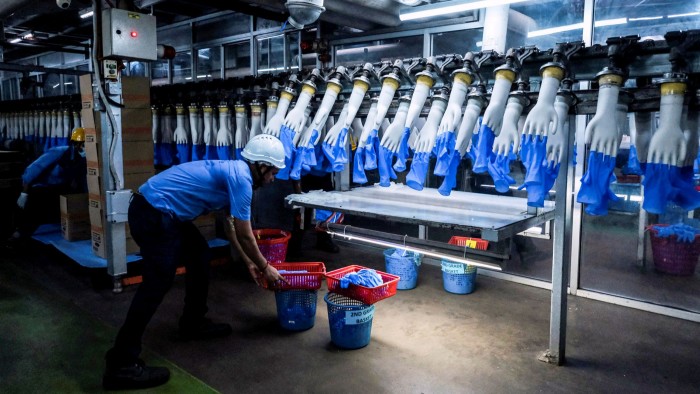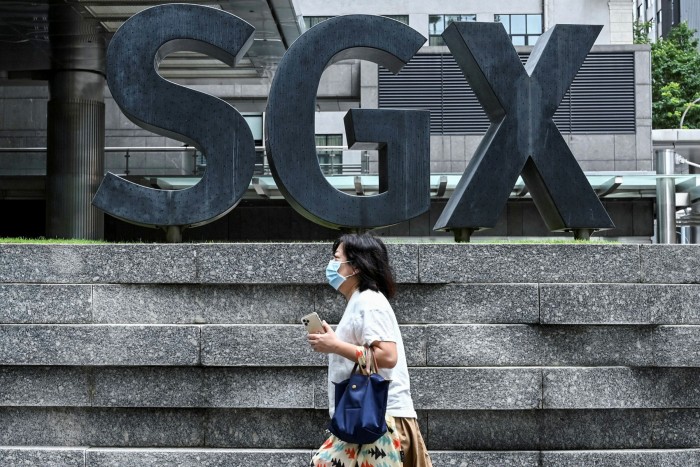Retail investment frenzy a boon for Asia-Pacific brokers

Simply sign up to the Investments myFT Digest -- delivered directly to your inbox.
The retail investor frenzy that has taken global markets by storm during the pandemic has been a shot in the arm for south-east Asia’s digital brokers and wealth management platforms.
Participation in the region’s markets has soared in the past year as online investor activism spread from the US, and as people put their lockdown-induced savings to work on easy-access digital trading platforms.
SGX, Singapore’s stock exchange, reports that retail investor participation has “increased significantly” since March 2020. “We continue to see retail activity at elevated levels, with a noticeable increase from both local and especially regional investors,” it says. “In all, retail trading volumes have nearly doubled since pre-Covid days.”
In Malaysia, demand for online brokerage services had also grown rapidly, with account openings on such platforms rising by more than 270 per cent as of October 2020 against the previous year, according to Syed Zaid Albar, chair of the Securities Commission. Average trading volumes via digital brokers had tripled. “The retail participation in this challenging environment has only increased,” Albar noted in October.
Later, in January, Malaysia witnessed the emergence of online investor activism through r/BursaBets, a Reddit forum of almost 14,000 users. It echoed the US subreddit r/WallStreetBets, whose several million participants earlier this year co-ordinated their trades to propel shares in games retailer GameStop into the stratosphere, alongside those of other companies that were the target of hedge funds’ bearish wagers.
Shares in Malaysian company Top Glove, the world’s largest rubber glove maker, climbed 14 per cent in a single day in late January after r/BursaBets users called on retail investors to buy the stock.
iFast, a Singapore wealth management platform, has witnessed the effects first hand. It is ranked 436th in the FT list of Asia-Pacific high-growth companies, compiled in partnership with Nikkei Asia and research provider Statista. That position is based on its 2016-19 revenues, which grew at a compound annual growth rate of 16 per cent.
But earlier this year, iFast found itself unable to meet buyer demand for some stocks, including GameStop, for half a day “mainly because counterparts that we use in the US put [in] the restrictions”, explains Lim Chung Chun, the company’s chief executive.

A surge in retail investor activity during the pandemic sped up expansion of the platform, which is mainly used by individual investors. iFast’s assets under administration in 2020 grew by a record 45 per cent on the previous year, to S$14.5bn, Lim says. This growth has driven a doubling of iFast’s share price this year.
The retail investor frenzy “accelerated our overall growth rate . . . that’s something that should continue to be a positive factor for the future”, Lim says, although he adds: “Overall trading activity . . . may not entirely be sustained for the market as a whole.”
Unlike the Robinhood trading platform in the US — which was at the centre of the GameStop frenzy — some of the largest online brokerages in south-east Asia charge user fees. Regulators also limit jurisdictions from which platforms can accept retail investors and in some cases set requirements for the size of investors’ net assets or annual income.
But this has not stopped retail investors flocking to Fundnel, a Singapore-based online platform for private capital markets, which took 107th place in the FT ranking with a 2016-19 CAGR of 81 per cent. Retail buyers represent a third of Fundnel’s 17,000 investor network, with institutional investors, venture capital, private equity funds, and family offices splitting the balance.
“Last year turned out to be one of our best years in terms of volume of transactions,” says Kelvin Lee, chief executive at Fundnel. By arranging online roadshows to present companies to potential investors “we ended up getting a lot of investor interest from other parts of the world . . . which would not have been possible with the traditional roadshow process”.
Fundnel received new investor interest from Mexico, New Zealand and Scandinavia during the pandemic. “We had to upgrade our Zoom membership to accommodate more people,” Lee says.
Kelvin Wong, a market analyst at Singapore trading platform CMC Markets, says a hunt for yield in a low-rate environment helped drive the jump in retail investor participation. “Investors are trying to seek higher returns away from safe havens like bank deposits and bonds,” he says.
But while the retail investor craze has become a global phenomenon during Covid-19, if central bankers start tightening monetary policy as a result of rising inflation, Wong says “we could start to see a tapering off of this bullish optimism, which in turn is triggering retail participation”.
Comments